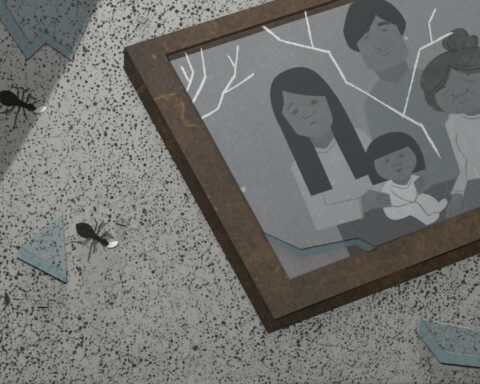This year’s field of Oscar-nominated documentary shorts champion engaged filmmaking in the age of Trump. All five nominees are American, but the concentration on the land of Uncle Sam illustrates the wealth of problems with which filmmakers must wrestle in the USA. These provocative films don’t shy away from hard issues. While the weight of the material makes for exhausting viewing, the five docs offer invaluable studies of subjects such as elder care, racialized violence, mental illness, recidivism, rehabilitation, and drug addiction. Any one of them could win the prize in one of the strongest line-ups of short docs the Academy delivered in some time.
The frontrunner might be Edith+Eddie (Dir. Laura Checkoway, 29 min.), which has a passionate backer in executive producer Cher and is one of two nominees for the unfathomably Oscarless Kartemquin Films. (The Chicago-based production company has another nominee in Steve James’s feature Abacus: Small Enough to Jail.) This verité-style doc takes audiences into the home of Edith Hill and Eddie Harrison who, at the ages of 96 and 95, were the oldest couple of newlyweds in the USA after finally tying the knot in 2014. Checkoway’s film is both sweet and devastating as her camera observes the tender relationship between the nonagenarians, who simply want to cherish their remaining days together in peace at Hill’s home in Virginia. However, Hill has dementia and her daughter Patricia wants to haul her down to Florida. (And put the house up for sale to scoop the inheritance away from Eddie.) Despite Hill’s protests that her son-in-law is abusive and that she’d much rather stay with Eddie, a bitter fight ensues as her daughter wins the trust of a legal guardian, Jessica Niesen, who decides Edith’s fate without ever meeting her. Niesen is an unseen force of evil in the film and has rightly become the face of public scorn as one of the most despicable movie villains of 2017.
Where race is an underlying issue in Edith+Eddie, it explodes provocatively in HBO’s Traffic Stop (Dir. Kate Davis, 30 min.). This difficult exposé of police brutality revisits an episode in which racist cop, Officer Bryan Richter, pulled over a young black woman named Breaion King for speeding. Traffic Stop provides the footage from Richter’s dashboard camera as he approached King, protesting that she wasn’t speeding and, in fact, was simply parking her car to get something to eat. Richter’s response was to forcefully usher King back into her car and, as her questions continued, the police officer’s anger escalated into a full-blown assault that included slamming the young woman into the ground while trying to handcuff her. The scene is deeply troubling—and undeniably real.
Davis intercuts the footage with recent interviews with King, who is a schoolteacher pursuing a doctorate in education. The interviews show a life upturned by the event, but also empowered by it as King inspires her students to be vigilant and open-minded. She is far from the violent thug that Richter perceived her to be. As the film cuts back and forth to the dashboard cam, Davis finds gripping and revealing evidence of the pervasive racism in America. Just listen to the language that Richter and the other cops use to rationalize violence. More troubling, however, is the unmistakable fear in King’s eyes and voice throughout the ordeal: she clearly thought her life was in danger and expected to become another Black life that didn’t matter to racist, trigger-happy cops. One can only imagine the untold stories from dashboard cameras across the country. Traffic Stop will be airing on HBO February 19th, with and an early preview on HBO NOW, HBO GO and HBO On Demand on February 16th.
Knife Skills (Dir. Thomas Lennon, 40 min.) tackles the justice system from another angle. The short doc asks what individuals and communities can do to inspire inmates from becoming repeat offenders. Brandon Chrostowski at Edwins’ restaurant in Cleveland, for example, helps inmates become new versions of Julia Child rather than career criminals by teaching them the art of French cooking. This scrumptious doc goes down as nicely as buttery cream sauce as Chrostowski helps fellow inmates by using the restaurant that saved him to help others. Director Thomas Lennon, who previously won the Oscar in this category for 2007’s The Blood of Yingzhou District, shows the difference between documentary and reality television by elevating Knife Skills beyond an episode of Kitchen Makeover and imbuing the subjects’ fight within a greater struggle for rehabilitation. The doc uses the stories of several inmates as they strive to educate themselves and escape a life of crime. Some relapse while others succeed, but in each story, Knife Skills conveys how changing one’s life and starting anew is a far trickier recipe to master than anything the Cordon Bleu can whip up. Watch Knife Skills below for free via The New Yorker!
Similarly, Heroin(e) (Dir. Elaine McMillion Sheldon, 40 min.) sees courageous individuals endeavour to better their communities. The doc follows three women in Huntington, West Virginia—a.k.a. “the overdose capital of America”—as they work tirelessly to save their neighbours struggling with addiction. Jan Rader, Chief of the Huntington Fire Department, races from incident to incident saving people from overdoses, lending her support to recovering addicts, and campaigning for community action to save as many lives as many times as needed. Necia Freeman tours Huntington offering bagged lunches to sex workers and hopes that the moral sustenance provided by a free meal may inspire women to get off the streets. Patricia Keller, finally, oversees the town’s drug court and keeps recovering addicts on the road to sobriety. The three-pronged portrait of heroism is inspiring, if utter hell to watch. Heroin(e) chronicles the valiant efforts of everyday heroes fighting against a broken system. Heroin(e) is now available on Netflix.
Of all the difficult docs Oscar has to offer, however, the group of nominees finds absolute serenity in the extraordinary Heaven is a Traffic Jam on the 405 (Dir. Frank Stiefel, 40 min.). Mindy Alper, the subject of 405, is simply a great character. A self-described “strange child,” Alper has mental health and behavioural issues that partly stem from childhood trauma and partly from electroshock therapy that caused permanent brain damage. She recalls episodes from her formative years that featured abuse, neglect, and isolation, which led to a total loss of speech and acute discomfort around people. (The title of the film comes from the tranquility she finds in being stuck in the cacophony of life while on the freeway, surrounded by people yet safely removed from them.) However, despite her roundabout way of discussing things—a “year,” for example, might be referred to as “one circle around the sun,” she is open about her mental illness with a candour that is truly disarming.
Alper shares her story and experiences while explaining how she found salvation through a mixture of therapy and art. The doc introduces Alper as she readies for an art show and it culminates with the completion of an enormous papier-mâché bust of her therapist that beautifully and evocatively displays the contradictions with which she wrestles in her busy mind. The film itself reflects this tempest of madness and creativity with animated sequences offering beautiful yet violent and jarring interpretations of Alper’s madness and insecurity. The film powerfully confronts the reality of living with mental illness and negotiating its pain every day, and poignantly realizes art’s ability to express unintelligible experiences through Stiefel’s eccentric approach that appropriately finds a visual equivalent to Alper’s language. Since the nominees are all character-driven tales that extend social issues stories from portraits of individuals, this compelling and idiosyncratic short blows the competition out of the water. What a remarkable work of art.
Which short gets your vote?
You can read more on the Oscar nominated features in our reviews of Abacus, Faces Places, Icarus, and Last Men in Aleppo











